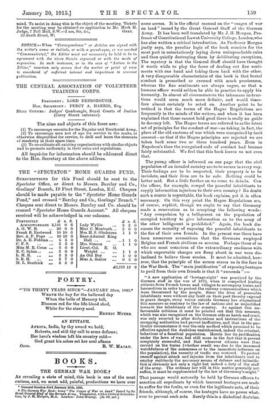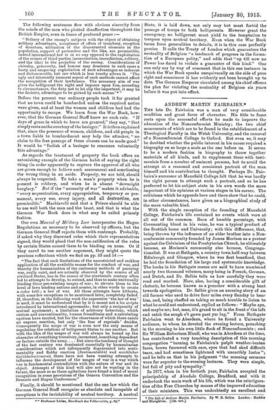BOOKS.
THE GERMAN WAR BOOK.f As revealing a state of mind, this book is one of the most curious, and, we must add, painful, productions we have ever
• General Gordon died January Nth, MSS.
.1. The German War Book: bring "This Usages of War on lead" Luna by the Great Germ Staff of the German Army. Tranelared, trial a Critical Introduc- tion, by J. Morgan. M.A. London: John Murray. (Ea eiL net) some moo. It is the official manual on the " usages of war on land" issued by the Great General Staff of the German Army. It has been well translated by Mr. J. 11. Morgan, Pro- fessor of Constitutional Law at University College, Loudon,who has also written a critical introduction. As Professor Morgan justly says, the peculiar logic of the book consists for the most part in ostentatiously laying down unimpeachable rules and then quietly destroying them by debilitating exceptions, The mystery is that the General Staff should have thought it worth while to play the farce of dealing out fine senti- ments with one hand and taking them back with the other. A very disagreeable characteristic of the hook is that brutal conduct is prescribed or excused with much preciseness, whereas the fine sentiments are always vague, so that a humane officer would seldom be able in practice to apply his humanity. In almost all circumstances the inhumane instruc- tions would seem much more definite, and would there- fore almost certainly be acted on. Another point to be noticed is that the terms of the Hague Regulations are frequently in the minds of the writers, and when it has been explained that these cannot hold good there is really no guide to decency left. The Hague terms are referred to as the latest set of principles for the conduct of war—as taking, in fact, the place of the old customs of war which were recognized by tacit consent—so that if the Hague principles are rejected we are taken back some two or three hundred years. Even in Napoleon's time the recognized code of conduct had become fairly substantial. We feel that this book leaves us not even that.
The young officer is informed on one page that the civil population of an invaded country are to be secure in every way. Their feelings are to be respected, their property is to be inviolate, and their lives are to be safe. Nothing could be better said. But a little further on we come to details. Can the officer, for example, compel the peaceful inhabitants to supply information injurious to their own country? No doubt such a course is regrettable, the book explains, yet it is often necessary. On this very point the Hague Regulations are, of course, explicit, though we ought to say that Germany made a reservation as to accepting the following words: "Any compulsion by a belligerent on the population of occupied territory to give information as to the army of the other belligerent is prohibited." Again, the book dis- cusses the morality of exposing the peaceful inhabitants to the fire of their own friends. In the present war there have been numerous accusations that the Germans employed Belgian and French civilians as screens. Perhaps those of us who arc most conscious of the extraordinary readiness with which unprovable charges are flung about in war were dis- inclined to believe these stories. It must he admitted, how- ever, that the principle of the screen stares us in the face in the War Book. The " main justification" of exposing hostages to peril from their own friends is that it "succeeds" new application of 'hostage-right was practised by the German staff in the war of 1870, when it compelled leading citizens from French towns and villages to accompany trains and locomotives in order to protect the railway communications which were threatened by the people. Since the lives of peaceable inhabitants were without any fault on their part thereby exposed to grave danger, every writer outside Germany has stigmatized this measure as contrary to the law of nations and as unjustified towards the inhabitants of the country. As against this un- favourable criticism it must be pointed out that this measure, which was also recognized on the German side as harsh and cruel, was only resorted to after declarations and instructions of the occupying authorities had proved ineffective, and that in the par- ticular eircumatance it was the only method which promised to be effective against the doubtless unauthorized, indeed the criminal, behaviour of a fanatical population. Herein lies its justification under the laws of war, but still more in the fact that it proved completely successful, and that wherever citizens were thus carried on the trains (whether result was duo to the increased watchfulness of the communes or to the immediate influence on the population), the security of traffic, was restored. To protect oneself against attack and injuries from the inhabitants and to employ ruthlessly the necessary means of defence and intimida- tion is obviously not only a right but indeed a duty of the staff of the army. The ordinary law will in this matter generally not suffice, it mast be supplemented by the law of the enemy's might."
That passage would naturally be held by German officers to sanction all expedients by which innocent hostages are made to suffer for the faults, or even for the legitimate acts, of their friends, although, of course, the hostages have no power what- ever to prevent such acts. Surely this is a diabolical doctrine.
The following sentences flow with obvious sincerity from the minds of the men who plotted disaffection throughout the British Empire, even in times of profound peace
" Bribery of the enemy's subjects with the object of obtaining military advantages, acceptance of offers of treachery, reception of deserters, utilization of the discontented elements in the population, support of pretenders and the like, are permissible, indeed international law is in no way opposed to the exploitation of the crimes of third parties (assassination, incendiarism, robbery, and the like) to the prejudice of the enemy. Considerations of chivalry, generosity, and honour may denounce in such cases a Hasty and unsparing exploitation of such advantages as indecent and dishonourable, but law which is less touchy allows it. ' The ugly and inherently immoral aspect of such methods cannot affect the recognition of their lawfulness. The necessary aim of war gives the belligerent the right and imposes upon him, according to circumstances, the duty not to let slip the important, it may be the decisive, advantages to be gained by such means!. "
Before the present war ordinary people took it for granted that no town could be bombarded unless the required notice were given, and at least the women and children had had the opportunity to escape. We learn from the War Book, how- ever, that the German General Staff know no such rule. "If days of grace in which to leave are granted," they say, "that simply rests on the courtesy of the besieger." It is then explained that, since the presence of women, children, and old people in a town liable to bombardment may help the attacker, " no claim to the free passage of these classes can be made good." It would be "foolish of a besieger to renounce voluntarily this advantage."
As regards the treatment of property the book offers an astonishing example of the German habit of saying the right thing (in order apparently to capture the approval of all who are green enough to believe such assurances) and sanctioning the wrong thing in an aside. Property, we are told, should always be respected. To take a man's property when he is present is robbery, and when Le is absent "downright burglary." But if the "necessity of war" makes it advisable, "every sequestration, every appropriation, temporary or per- manent, every use, every injury, and all destruction, are permissible." Machiavelli said that a Prince should be able to use well both the man and the beast, and that is what the German War Book does in what may be called princely fashion.
Our own Manual of Military Law incorporates the Hague Regulations as necessary to be observed by officers, but the German General Staff rejects them with contempt. Probably, if asked why they disowned rules which their representatives signed, they would plead that the non-ratification of the rules by certain States caused them to be binding on none. Or if they cared to use another argument, they might quote the precious reflections which we find on pp. 53 and 54
" The fact that such limitations of the unrestricted and reckless application of all the available means for the conduct of war, and thereby the humanization of the customary methods of pursuing war, really exist, and are actually observed by the armies of all civilized States, has in the course of the nineteenth century often led to attempts to develop, to extend, and thus to make universally binding these pre-existing usages of war ; to elevate them to the level of laws binding nations and armies, in other words to create a codes belli; a law of war. All these attempts have hitherto, with some few exceptions to be mentioned later, completely failed. If, therefore, in the following work the expression the law of war' is used, it must be understood that by it is meant not a lea scripts introduced by international agreements; but only a reciprocity of mutual agreement; a limitation of arbitrary behaviour, which custom and conventionality, human friendliness and a calculating egotism have erected, but for the observance of which there exists no express sanction, but only 'the fear of reprisals' decides. Consequently the usage of war is even now the only means of regulating the relations of belligerent States to one another. But with the idea of the usages of war will always be bound up the character of something transitory, inconstant, something dependent on factors outside the army.... But since the tendency of thought of the last century was dominated essentially by humanitarian considerations which not infrequently degenerated into senti- mentality and flabby emotion (Sentimentalikat surd weichlicher GefirhIschwarmerei) there have not been wanting attempts to influence the development of the usages of wax in a way which was in fundamental contradiction with the nature of war and its object. Attempts of this kind will also not be wanting in the future, the more so as these agitations have found a kind of moral recognition in some provisions of the Geneva Convention and the Brussels and Hague Conferences."
Finally, it should be mentioned that the one law which the German General Staff recognize as absolute and incapable of exceptions is the inviolability of neutral territory. A neutral
"• Professor Lade; Handbuch des Yolkerrichts, p. DO."
State, it is laid down, not only may but must forbid the passage of troops to both belligerents. However great the emergency, no belligerent must yield to the temptation to trespass upon neutral territory. Even when the War Book turns from generalities to details, it is in this case perfectly precise. It calls the Treaty of London which guarantees the neutrality of Belgium "a landmark of progress in the forma- tion of a European polity," and adds that "up till now no Power has dared to violate a guarantee of this kind." One can only say by way of comment that in this one instance in which the War Book speaks unequivocally on the side of pure right and conscience it has evidently not been brought up to date. The German Emperor circulated among his chief officers the plan for violating the neutrality of Belgium six years before it was put into effect.



















































 Previous page
Previous page